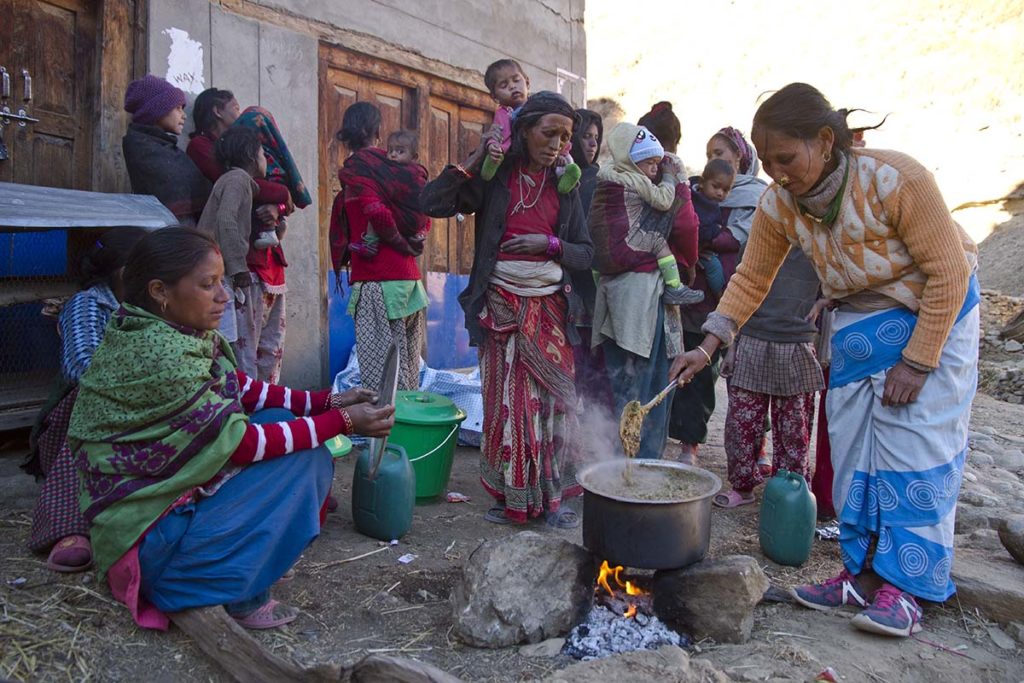High up in the mountain communities of Northwest Nepal, it gets cold. Very cold.
Winter runs from November through to April, and on most days temperatures don’t go above freezing. The cold winter weather and frozen ground makes growing things difficult – and that’s a big problem for the local farmers that live in these regions.
As a country, Nepal is heavily reliant on farming – so much so that more than three quarters of Nepalese households are agricultural households. Although farming accounts for many people’s livelihoods, it makes up only 34% of the country’s Gross Domestic Product. And that’s a big problem.
The latest World Bank figures that date back to 2010 show that a quarter of Nepal’s population live in poverty. Maternal and child malnutrition are serious problems.
Despite making up the majority of the farming workforce, many rural women live in extreme poverty, which means that they don’t have access to health care, education and nutrition, and are excluded from decision making processes in their community.
It’s against this backdrop that the Nepal Agriculture Food Security Project, known as the AFSP, was started. Funded by an international food and agriculture fund called the GAFSP, the project aims to equip farmers with new farming tools and techniques, introduce new breeds of animals that would prove more profitable and suitable to the difficult conditions, and provide nutrition training so that women in the villages can quickly learn how to integrate fresh foods into their diets.

Standing on a small terrace that can be no more than 15 feet wide on the side of a mountain, Munkala Buda proudly showed me her greenhouse. She said:
“In the winter we have problems with food, problems with vegetables. Now we can grow our own. By eating all these vegetables like eggplants, mustard, coriander, the children and old people got healthier.
“We get to eat green vegetables that we grow in here which makes us strong and well-nourished so we don’t get sick easily.”
But growing the food is only one part of the project. Communities in the regions where it’s active are used to only being able to grow rice and grains during the winter months, so it’s important to raise awareness about how other types of vegetables can be included in their daily diets.
Junkali Shahi is a local volunteer who teaches women from her village how they can cook the different vegetables and include them in their daily diets. I sat down to talk to her outside her house that’s located on a flat plain next to a river. At first glance, the area seems picture perfect, but it’s clear that malnutrition has been a big problem in her community for many years.
She told me how a group of 25 people from the village received training under the AFSP: “Every first week of the month we meet and provide training for them on how to make nutritional meals. They leave with that knowledge and follow the same in their kitchens.
“Before, we used to have two meals a day – one in the morning and one in the evening, with a light snack in the middle of the day. Kids didn’t get to drink their mother’s milk, as they had to leave for work. But now everyone knows the importance of having nutritious food.”
But it’s not only about being able to grow enough food for their families. An important part of the project looks at ways to generate incomes for families in these often-isolated rural communities. Bear in mind that in many households, women are left to do everything for themselves, as many of the men from these communities are away working in countries in the Gulf to earn money that they can send home. They’re doing this because up until now, there haven’t been many opportunities for them at home.
The AFSP project is trying to change this. Not only do the farmers grow food for their families, they can also sell the excess at the local markets. But it’s more than selling vegetables that’s making the difference for these families. The AFSP is supporting communities to breed goats and produce seeds that they can sell through networks established by the project to make a bit more cash.
Kaushila makes her money growing wheat, mustard and corn seeds that she sells to other farmers through a local cooperative. The project has supported her with seeds and the expertise she needs to set up her business, as well as equipping the cooperative so that it can make sure the seeds are good quality before they’re sold.
Although those that run the AFSP wish that it could be bigger to reach more families, it’s clear that the work is having an impact. People talked about how they were sharing the knowledge they had gained through the project with their neighbors. In doing so, they are making sure that families who can’t be part of the project aren’t left behind.
What’s clear, is that investing in local farmers is key to reducing poverty in Nepal. But governments need to keep funding the GAFSP so projects like this one can continue.

